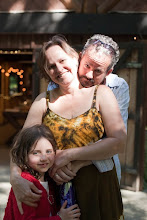The trach has brought many changes, some expected, many not. The medical advice given was that since it was inevitably going to happen, do it sooner rather than later. This is sensible counsel, as having to do it in an emergency situation can have bad long term consequences.
But, wow. What a giant shift for me, my family and community.
First and foremost, as I mentioned in my last post is communication. There are hi-tech (hi-cost) solutions and lo-tech hacks, but there are many times when there's only blinks and nods (and flailing legs in desperation). Standing is particularly challenging as my neck muscles have weakened to the point where I can't hold my head up without great difficulty. So eyegaze, toe boards and blinking are not useful for trying to convey anything. This requires a high degree of coordination between carer (a new word in my lexicon) and myself.
Standing and walking has become quite difficult as well. After 3 weeks of lying in bed at the hospital, my already weak legs have become virtually useless. I have to stand at least once a day just to stretch my calves. This is usually facilitated by the need for bowel activity, a major highlight of the day.
I have a hi-tech bed that adjusts head, legs and height - topped with an air matress that has individual tubes that are inflated and deflated by a controller that can gently rock me back and forth to help minimize pressure sores. Since most of my day is spent in bed, this is another piece of essential gear. We have added two inch memory foam pad and have built custom arm pads out of carefully sized (read trial and error) and sewn together memory foam. These armrests come complete with holes cut in allowing my elbows to float.
Getting out of bed requires the help of one muscular person. It's a move of lifting my upper body and head and spinning me so that I'm on the edge of the bed. Next I stand and stretch for a minute then perform a move known as stand and pivot. Whatever I'm transferring to is positioned so that I can turn slightly and sit. While this sounds like a major production, it pales in comparison to the alternative, the "hoyer".
Google it...
Subscribe to:
Post Comments (Atom)

1 comment:
some comment on these 2 sentences: "So eyegaze, toe boards and blinking are not useful for trying to convey anything. This requires a high degree of coordination between carer (a new word in my lexicon) and myself."
I thought these tools, while certainly limited, were fairly useful for communication. No?
And yes, coordination between you and your carer is very important. I know that towards the end of my time there I was sometimes able to predict your next request or read your eyes quickly. Your eyes are very expressive. :-)
All the more reason I need to come back - I already "get" it.
Hugs,
Post a Comment